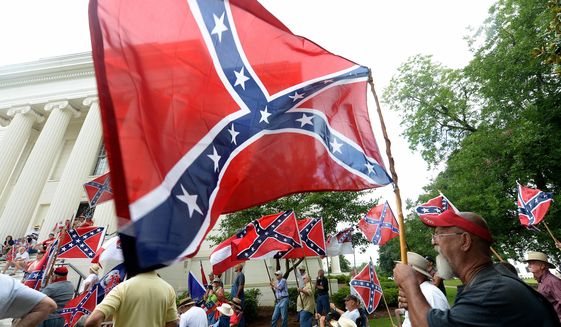The Civil War that Never Ends
By Wesley Pruden
WashingtonTimes.com

Supporters gather for
a rally to protest the removal of Confederate
flags from the Confederate Memorial Saturday,
June 27, 2015, in Montgomery, Ala. (Julie
Bennett/AL.com via AP)
Breaking news from 1865: There’s a war on between the North and the South. This time it’s barely more civil than last time, though we aren’t shooting at each other. Yet.
For a fortnight, after a nutty kid with a gun, a Confederate battle flag and no sense, shot up a Bible class in South Carolina, killing nine Christians, the nation has been on a hysterical binge to eradicate the flag and eliminate all traces of Southern heritage, though honored for centuries.
The mayor of Memphis wants to dig up a Confederate general and his wife buried in a city park, and dump the remains in a hole somewhere else. Yale University is looking for something to destroy to apologize for John C. Calhoun, a famous alumnus. One Episcopal divine even wants to knock out stained-glass windows at the National Episcopal Cathedral in Washington depicting Robert E. Lee at prayer. You might think such divines would encourage prayer, even among evildoers, but lynch mobs rarely leaven their hate with reason.
A couple of Southern governors, looking for friends elsewhere, joined the din with unctuous promises to furl the famous battle flag, copied from the St. Andrew’s Cross that once flew over regiments of Scottish ancestors of the Southerners now doomed to learn groupthink under Reconstruction II in a new American purgatory.
The backlash, inevitable as a summer thunderstorm, has begun. Hundreds of polite but angry folks in pickup trucks flying the verboten flag descended on Russellville, Arkansas, for a states’ rights rally on Sunday. They drove through the city waving the flag, as if to defy the wave of political correctness abroad in the land. Not all of them were white.
At the Daytona International Speedway in Daytona Beach, Florida, the mother church of NASCAR racing, hundreds of fans defied a ban on the Confederate battle flag, and flew the flag above tents, trailers and cars and adorned their coolers and their skin with forbidden emblems of the South.
Debate raged anew in Texas over how the Civil War should be “interpreted” in textbooks, which is important because nearly half the states, most of them in the South, buy textbooks written and published for public schools in Texas, which is by far the largest single market for the books.
In the tumult over the Confederate battle flag (and whether Robert E. Lee can be properly depicted as on his knees in prayer), the endless argument continued over whether the Civil War was about slavery or states’ rights. James Grossman, the director of the American Historical Association, argues that since most professors agree that slavery was the “primary cause,” the debate is over.
“The War happened only because of the determination of the eleven states [of the Confederacy] to defend the right of their residents to own other human beings,” he tells The Washington Post. “The Civil War was fought over the issue of slavery.”
But not so fast. The issue is not so clear-cut as that. President Lincoln had insisted from Fort Sumter that his war was fought to prevent states from exercising their right to leave the union. “My paramount object in this struggle is to save the Union,” he told Horace Greeley in a letter to the editor of the New York Tribune, “and is not either to save or destroy Slavery. If I could save the Union without freeing any slave, I would do it, and if I could save it by freeing all the slaves, I would do it, and if I could save it by freeing some and leaving others alone, I would also do that. What I do about Slavery and the colored race, I do because I believe it helps to save this Union, and what I forbear, I forbear because I do not believe it would help to save the Union.”
That sounds pretty definite in an era when words were universally understood to mean what they said. But in 1862 many one-year enlistments were about to expire, and Lincoln thought he needed something more inspiring to keep his armies together. He proposed to emancipate the slaves, but when he read his draft to his Cabinet in July 1862, William Seward, the secretary of state and a devout and eloquent abolitionist, urged him to stay his hand. Such a “dynamic change” in the focus of the war, fought to preserve the union without “disrupting the South’s social fabric,” could be interpreted as a plea for a negotiated end to the war. Lincoln understood that he needed the momentum of a great victory. When Lee and George B. McClellan fought to a draw at Antietam, he issued his proclamation, which exempted the four slave states — Delaware, Maryland, Kentucky and Missouri — which remained bitterly divided but loyal to the union.
Both bitterness and loyalty remain little changed, and certain soldiers of piety, who just can’t let the past go, have been itching to eliminate all traces of Southern valor since.
• Wesley Pruden is editor emeritus of The Times.

